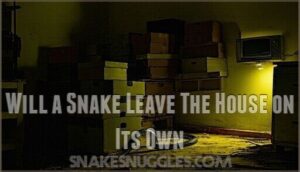This site is supported by our readers. We may earn a commission, at no cost to you, if you purchase through links.

What makes this timeline so variable comes down to a mix of biology and circumstance. A large adult ball python with decent fat reserves operates on a completely different survival clock than a juvenile corn snake. Add in access to water from a leaky pipe or condensation, maybe a stray mouse in the walls, and you’ve got a snake that’s not just surviving—it’s practically thriving in its accidental hideaway. To understand how long a snake can live lost in a house, you need to get inside the head (and body) of an animal designed to endure scarcity, and recognize that your home might be offering more resources than you’d expect.
Table Of Contents
- Key Takeaways
- How Long Can a Snake Live Lost in a House?
- How Long Can a Snake Survive Without Food
- Where Would a Snake Hide in a House
- Will a Snake Leave The House on Its Own
- Frequently Asked Questions (FAQs)
- How long can a snake live inside a house?
- How long can a snake live?
- How long can a snake survive without food or water?
- What to do if you find a snake in Your House?
- What happens if a snake escapes?
- Why do snakes need a warm house?
- How long will a snake hide in a house?
- What to do if you lose your snake in your house?
- Where would a snake hide in a house?
- Will a snake leave your house on its own?
- Conclusion
Key Takeaways
- Healthy snakes can survive lost in your house for two to six months or longer, depending on species size, fat reserves, and access to water sources like leaky pipes or condensation.
- Most snakes can last 4-5 weeks without food through metabolic suppression, but larger species like ball pythons can survive up to six months by reducing their metabolic rate by up to 72%.
- Snakes instinctively seek dark, enclosed spaces that mimic natural dens—basements, behind appliances, and inside cabinets—where they’ll remain motionless rather than searching for an exit on their own.
- Water availability poses a faster survival threat than hunger, with dehydration risks becoming critical after just one to two weeks without access to moisture.
How Long Can a Snake Live Lost in a House?
How long can a snake survive when it slips into your home unnoticed? Depending on the species, size, and indoor conditions, a snake can live for several weeks to several months inside a house. Snake physiology plays a huge role—larger adults survive longer than juveniles due to fat reserves and slower metabolic rates.
A snake’s ability to survive indoors depends heavily on finding water—think dripping faucets or your pet’s water bowl—and catching the occasional mouse or insect.
They’re drawn to quiet, dark corners where no one bothers them: behind your water heater, deep in the crawl space, or tucked under kitchen cabinets. These spots offer the steady temperatures snakes need, and if conditions stay right, they can live there much longer than you’d expect.
Understanding the factors that influence a snake’s decision to stay, such as snake stay duration, is key for effective removal and prevention strategies.
How Long Can a Snake Survive Without Food
So how long can a snake actually survive without food once it’s lost in your home? Most snakes can last 4-5 weeks without eating, though snake fasting limits extend much further for larger species. Ball pythons and rattlesnakes have survived up to six months in laboratory settings, demonstrating impressive survival tactics through metabolic suppression.
When snakes go without food, their metabolism drops dramatically—some species can dial it down by up to 72% to stretch their energy reserves. Several factors determine how long they’ll last:
- Species and size: Ambush predators like pythons outlast active hunters due to naturally slower metabolism
- Age and body condition: Adults with substantial fat reserves endure longer than juveniles
- Temperature: Cooler indoor environments trigger metabolic depression, extending snake lifespan during starvation
- Initial health: Well-fed snakes entering food deprivation can lose just 0.004% body mass daily
While starvation effects eventually threaten organ function, your missing snake could survive months indoors before facing critical health decline—though dehydration poses a faster threat than hunger. Snakes have adapted to survive prolonged periods without food by employing unique energy conservation strategies.
Where Would a Snake Hide in a House
Your snake’s survival instincts will pull it toward dark, enclosed spots that feel like natural dens.
Knowing where snakes tend to hide is essential for keeping your home safe when you’re dealing with an unexpected reptile visitor.
When a snake gets inside, it’ll head straight for spots that feel safe and warm.
Here’s where you’re most likely to find one—these locations account for over 60% of indoor encounters:
- Basements and crawl spaces – undisturbed areas provide ideal snake habitat conditions
- Behind large appliances – refrigerators and ovens generate consistent warmth, attracting snakes in 20% of cases
- Inside kitchen cupboards and pantries – these cozy nooks account for 25% of residential recoveries
- Between baseboards and walls – snakes exploit gaps less than an inch wide to squeeze into wall cavities
- Under beds and furniture – dark, quiet zones where snakes remain undetected for extended periods
Check tight spaces systematically—anywhere that feels like a hidden shelter is worth inspecting closely.
Will a Snake Leave The House on Its Own
Most snakes won’t venture out on their own—they’re wired to hunker down in whatever safe spot they’ve claimed, not search for an exit sign. Snake behavior leans heavily toward staying put rather than exploring house layout for snake exit strategies. They’re solitary creatures that prioritize security over snake migration, making escape prevention a non-issue for them—but a challenge for you.
Walls and closed doors aren’t just barriers—they actually box your snake in. Without something urgent driving it (think hunger or serious thirst), it’ll stay tucked in whatever corner it’s claimed.
Grasping this pattern makes your search more strategic and keeps your home safer.
| Factor | Impact on Snake Leaving |
|---|---|
| Natural instinct | Prefers hiding over exploring |
| House barriers | Walls/doors prevent easy exit |
| Food/water needs | Only motivator for movement |
| Temperature zones | Remains near warmth sources |
| Human activity | Causes retreat, not escape |
For effective snake removal, you’ll have to actively search—they won’t show themselves out.
Frequently Asked Questions (FAQs)
How long can a snake live inside a house?
Depending on the species and conditions, your uninvited guest can survive anywhere from several weeks to several months indoors.
Things like a snake’s size, age, and overall health matter, but water availability is what really determines how long it’ll stay in your home.
How long can a snake live?
Lifespan? Astronomically variable! Survival hinges on snake size, age factors, health status, and water needs.
Smaller species may last weeks, while larger, healthy snakes survive months in hiding spots—if they’ve got access to moisture.
How long can a snake survive without food or water?
Without food, your snake can survive for four to eight weeks—larger species can extend that to two months or more thanks to their fat reserves.
Water is a different story: dehydration risks skyrocket after just a week or two, making hydration the real limiting factor in snake survival.
What to do if you find a snake in Your House?
Finding a snake lounging in your living room—because obviously that’s where they host their open houses—calls for calm household safety measures.
Skip the DIY heroics—call a wildlife expert instead. They’ll safely remove your scaly visitor, identify the species (so you’ll know if it’s harmless or not), and help you figure out how it got in so you can seal up entry points.
What happens if a snake escapes?
When a snake escapes, it immediately seeks the nearest hiding spot—usually a dark, tight space like cabinets or behind appliances.
Once a snake escapes, it won’t just wander off—it’ll hunker down in the nearest dark corner or tight space, staying perfectly still to conserve energy.
These escapees typically wait for the right moment to find warmth or water, relying entirely on instinct rather than actively exploring your home.
Why do snakes need a warm house?
Think of warmth as fuel for snakes, cold-blooded reptiles that rely on external heat sources for thermoregulation.
Without adequate warmth provided through indoor climate control or heating sources, their metabolism slows dramatically, impacting their behavior and survival.
How long will a snake hide in a house?
Most snakes don’t simply leave—they’ll remain concealed for weeks or even months, relying on reptile behavior that prioritizes survival without food.
They’re expert survivors that take full advantage of indoor conditions—quiet spots near water sources, the occasional mouse or insect, and plenty of places to stay hidden for weeks or months at a time.
What to do if you lose your snake in your house?
Start by checking warm, enclosed spaces—behind appliances, inside cabinets, or near heat sources. Lower room temperatures and place heat lamps to draw your lost snake out.
Set flour along walls to track movement, and stay patient; many snakes reappear weeks later when you maintain calm, systematic indoor search techniques.
Where would a snake hide in a house?
Your missing snake is probably curled up in dark spaces like behind appliances, inside cabinets, or between walls and baseboards.
These secluded areas and cozy nooks mimic natural snake dens—tight, warm, and protected from disturbance, making them prime hiding spots for wildlife in homes.
Will a snake leave your house on its own?
Unfortunately, no—your lost snake won’t leave on its own. Snake hiding behavior keeps them sheltered in dark, enclosed spaces where they feel secure, not searching for house entry points or snake escape routes.
Their instinct to stay hidden trumps any urge to roam, which means you’ll need solid prevention tactics and careful room-by-room checks to get your home secure again.
Conclusion
Remember: patience beats panic when you’ve lost a snake indoors. Knowing a snake can survive in a house for months under the right conditions helps you search methodically instead of frantically.
Check warm, dark hiding spots systematically, secure water sources, and don’t assume it’s left on its own. With persistence and the right approach, you’ll reclaim your space and find your missing reptile before its survival skills turn into a long-term issue.
- https://www.reddit.com/r/cornsnakes/comments/p67m5s/how_long_can_a_corn_snake_go_without_food_or_water/
- https://a-z-animals.com/articles/how-long-snakes-go-without-water-answer-more-complicated-than-you-think/
- https://stevenbolgartersnakes.com/publications-2/hibernating-garter-snakes/
- https://www.youtube.com/watch?v=IfLTGpwEIcs
- https://rattlesnakesolutions.com/snakeblog/snake-removal/rattlesnake-in-a-house-how-does-this-even-happen/








